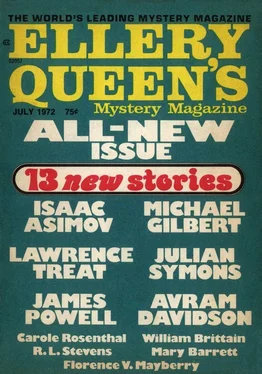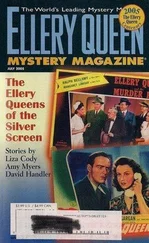Ellery Queen’s Mystery Magazine, Vol. 60, No. 1. Whole No. 344, July 1972
Здесь есть возможность читать онлайн «Ellery Queen’s Mystery Magazine, Vol. 60, No. 1. Whole No. 344, July 1972» весь текст электронной книги совершенно бесплатно (целиком полную версию без сокращений). В некоторых случаях можно слушать аудио, скачать через торрент в формате fb2 и присутствует краткое содержание. Город: New York, Год выпуска: 1972, Издательство: Davis Publications, Жанр: Классический детектив, на английском языке. Описание произведения, (предисловие) а так же отзывы посетителей доступны на портале библиотеки ЛибКат.
- Название:Ellery Queen’s Mystery Magazine, Vol. 60, No. 1. Whole No. 344, July 1972
- Автор:
- Издательство:Davis Publications
- Жанр:
- Год:1972
- Город:New York
- ISBN:нет данных
- Рейтинг книги:4 / 5. Голосов: 1
-
Избранное:Добавить в избранное
- Отзывы:
-
Ваша оценка:
- 80
- 1
- 2
- 3
- 4
- 5
Ellery Queen’s Mystery Magazine, Vol. 60, No. 1. Whole No. 344, July 1972: краткое содержание, описание и аннотация
Предлагаем к чтению аннотацию, описание, краткое содержание или предисловие (зависит от того, что написал сам автор книги «Ellery Queen’s Mystery Magazine, Vol. 60, No. 1. Whole No. 344, July 1972»). Если вы не нашли необходимую информацию о книге — напишите в комментариях, мы постараемся отыскать её.
Ellery Queen’s Mystery Magazine, Vol. 60, No. 1. Whole No. 344, July 1972 — читать онлайн бесплатно полную книгу (весь текст) целиком
Ниже представлен текст книги, разбитый по страницам. Система сохранения места последней прочитанной страницы, позволяет с удобством читать онлайн бесплатно книгу «Ellery Queen’s Mystery Magazine, Vol. 60, No. 1. Whole No. 344, July 1972», без необходимости каждый раз заново искать на чём Вы остановились. Поставьте закладку, и сможете в любой момент перейти на страницу, на которой закончили чтение.
Интервал:
Закладка:
“Your word against mine. I should deny saying it.”
“Something else. A witness saw you leave the cottage. Didn’t know you, but gave us a description, said he’d know you again.”
“One witness. A good counsel would—”
“You were whistling that catchy little tune. Favorite of yours, isn’t it? The witness got it loud and clear.” Golightly began to sing, loudly, but in tune:
“Carry the man who was born to be King
Over the sea to Skye.”
Two things happened together. The car that had been flashing drew level, switched on a spotlight, began blaring away with a hooter. And Golightly, in a quite different voice, loud and angry, cried, “Give me that gun,” and threw himself across the steering wheel, pinioning Donald’s right arm to his pocket.
Donald just had time to realize that he was not able to control the car with his left hand, and to think about the bad luck that seemed to have dogged his whole life, and then there was nothing...
Golightly woke up in a hospital bed. The Superintendent was glaring down at him. “You’re a fool, Golly. Only cuts and bruises, but you’re lucky to be alive. Grant isn’t.”
“He bought it?”
“A sliver of glass through the neck when you crashed. You had no need to get into his car, no need at all. Just let us know what road he was on, that’s all you had to do.”
“Yes, sir. It seemed a good idea at the time.”
“And why the hell did you have to leave that café with him?”
“He’d have taken me along anyway, sir. I’d been needling him and I made a slip. He was on to me.”
“Don’t expect any medals. What was the slip?”
Golightly told him. “He made one, too — mentioned the time she was killed; but of course he’d have denied it. He broke when I told him we had a witness who’d seen him leave the house and heard him whistling that song — you know, song of the Skye boatmen. One of the villagers said he was fond of it.”
“We had no witness.”
“No, sir. But he didn’t know that. And he was fond of that song, kept whistling in the car.” Virtuously Golightly said, “I don’t like whistling. Bad manners, bad habit. Can get you into trouble.”
The Phony Ph.D.
by Isaac Asimov { ©1972 by Isaac Asimov. }
As predicted and promised, the Black Widowers have beome a series. To refresh your memory, the first tale of the Black Widowers, “The Acquisitive Chuckle,” appeared in our January 1972 issue and introduced the five members of the club: organic chemist James Drake, code expert Thomas Trumbull, writer Emmanuel Rubin, patent attorney Geoffrey Avalon, and artist Mario Gonzalo. (And let’s not forget Henry the waiter.) At each monthly meeting the host brings a guest for grilling. In this second story the subject scheduled for cross-examination is Dr. Arnold Stacey, Ph.D. But in this session something different happens. Dr. James Drake, Ph.D., has an academic mystery to put before his colleagues and the guest...
The meeting of the Black Widowers was marred, but only slightly, by the restlessness of James Drake.
It was a shame this had to be so for the dinner was unusually good, even allowing for the loving care with which the “Milano” served its special group every month. And if the veal cordon bleu needed anything to add the final bit of luster, it was Henry’s meticulous service, which had a plate on the table where no plate had been before, yet without any person present able to catch sight of it en route.
It was Thomas Trumbull’s turn to be host, something he did with a savagery to which no one paid the slightest attention — a savagery made particularly bitter by the fact that as host he did not think it fit to come charging in just one second before the preprandial drinks had completed their twice-around (three times for Rubin, who showed no effects).
Trumbull had exercised the host’s privilege and brought a guest for the grilling. The guest was tall, almost as tall as Geoffrey Avalon, the Black Widowers’ patent-attorney member. He was lean, almost as lean as Geoffrey Avalon. He was clean-shaven, though, and lacked Avalon’s solemnity. Indeed, his face was round and his cheeks were plump, in a manner so out of keeping with the rest of his body that one might have thought him the product of a head transplant. His name was Arnold Stacey.
“Arnold Stacey, Ph.D.,” Trumbull had introduced him.
“Ah,” said Avalon, with the air of portentousness he automatically gave to his most trivial statement. “Doctor Doctor Stacey.”
“Doctor Doctor?” murmured the guest, his lips parting as though getting ready for a smile at the pleasantry sure to follow.
“It is a rule of the Black Widowers,” said Trumbull impatiently, “that all members are doctors by virtue of membership. A doctor for any other reason is—”
“— a Doctor Doctor,” finished Stacey. And he smiled.
“You can count honorary doctorates, too,” said Rubin, his wide-spaced teeth gleaming over a beard as straggly as Avalon’s was crisp. “But then I would have to be called Doctor Doctor Doctor—”
Mario Gonzalo was mounting the stairs just then, bringing with him a faint whiff of turpentine as though he had come straight from his artist’s studio. (Trumbull maintained you couldn’t draw that conclusion, that Gonzalo placed a drop of turpentine behind each ear before every social engagement.)
Gonzalo was in time to catch Emmanuel Rubin’s statement and said, before he had quite reached the top step, “What honorary doctorates did you ever receive, Manny? Dis honorary doctorates, more likely.”
Rubin’s face froze, as it usually did when he was attacked without warning; but that was merely the short pause necessary for him to gather his forces. He said, “I can list them for you. In 1938, when I was only fifteen, it so happens I was a revivalist preacher and I received a D.D. from—”
“No, for God’s sake,” said Trumbull, “don’t give us the list. We accept it all.”
“You’re fighting out of your weight, Mario,” said Avalon with wooden amiability. “You know Rubin can never be caught in an inconsistency once he starts talking about his early life.”
“Sure,” said Gonzalo, “that’s why his stories are so dull. They’re all autobiographical. No poetry.”
“I have written poetry—” began Rubin, and then Drake appeared. Usually he was the first person there; this time he was the last.
“Train late,” he said quietly, shucking his coat. Since he had to come from New Jersey to attend, the only surprise was that it didn’t happen oftener.
“Introduce me to the guest,” Drake added, as he turned to take the drink that Henry the waiter held out for him.
Avalon said, “Doctor Doctor Arnold Stacey — Doctor Doctor James Drake.”
“Greetings,” said Drake, holding up his glass in salute. “What’s the nature of the lesser doctorate, Doctor Stacey.”
“Ph.D. in chemistry, Doctor Doctor, and call me Arnold.”
Drake’s small grizzled mustache seemed to bristle. “Ditto,” he said. “My Ph.D. is also in chemistry.”
They looked at each other warily for a moment. Then Drake said, “Industry? Government? Academic?”
“I teach. Assistant Professor at Berry University,” Stacey replied.
“ Where ?”
“Berry University. It’s not a large school. It’s in—”
“I know where it is,” said Drake. “I did graduate work there — considerably before your time, though. Did you get your degree at Berry before you joined the faculty?”
Читать дальшеИнтервал:
Закладка:
Похожие книги на «Ellery Queen’s Mystery Magazine, Vol. 60, No. 1. Whole No. 344, July 1972»
Представляем Вашему вниманию похожие книги на «Ellery Queen’s Mystery Magazine, Vol. 60, No. 1. Whole No. 344, July 1972» списком для выбора. Мы отобрали схожую по названию и смыслу литературу в надежде предоставить читателям больше вариантов отыскать новые, интересные, ещё непрочитанные произведения.
Обсуждение, отзывы о книге «Ellery Queen’s Mystery Magazine, Vol. 60, No. 1. Whole No. 344, July 1972» и просто собственные мнения читателей. Оставьте ваши комментарии, напишите, что Вы думаете о произведении, его смысле или главных героях. Укажите что конкретно понравилось, а что нет, и почему Вы так считаете.












